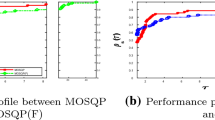Abstract
A Sequential Quadratic Programming (in short, SQP) algorithm is presented for solving constrained nonlinear programming problems. The algorithm uses three stepsize strategies, in order to achieve global and superlinear convergence. Switching rules are implemented that combine the merits and avoid the drawbacks of the three stepsize strategies. A penalty parameter is determined, using an adaptive strategy that aims to achieve sufficient decrease of the activated merit function. Global convergence is established and it is also shown that, locally, unity step sizes are accepted. Therefore, superlinear convergence is not impeded under standard assumptions. Global convergence and convergence of the stepsizes are displayed on test problems from the Hock and Schittkowski collection.
Similar content being viewed by others
References
Fletcher, R.: Practical Methods of Optimization, 2nd edn. Wiley, New York (1987)
Gill, P.E., Murray, W., Wright, M.H.: Practical Optimization. Academic Press, San Diego (1981)
Pardalos, P.M., Resende, M.G.C.: Handbook of Applied Optimization. Oxford University Press, London (2002)
Floudas, C.A., Pardalos, P.M.: Encyclopedia of Optimization, vols. I–VI. Kluwer Academic, Dordrecht (2001)
Tzallas-Regas, G.: Switching stepsize strategies for Nonlinear Programming. Ph.D. thesis, University of London, Imperial College London, London (2007)
El-Bakry, A.S., Tapia, R.A., Tsuchiya, T., Zhang, Y.: On the formulation and theory of the Newton interior-point method for nonlinear programming. J. Optim. Theory Appl. 89, 507–541 (1996)
Shanno, D.F., Simantiraki, E.M.: Interior point methods for linear and nonlinear programming. In: The State of the Art in Numerical Analysis, York, 1996. Inst. Math. Appl. Conf. Ser. New Ser., vol. 63, pp. 339–362. Oxford University Press, London (1997)
Pietrzykowski, T.: An exact potential method for constrained maxima. SIAM J. Numer. Anal. 6, 299–304 (1969)
Han, S.P.: A globally convergent method for nonlinear programming. J. Optim. Theory Appl. 22, 297–309 (1977)
Powell, M.J.D.: A fast algorithm for nonlinearly constrained optimization calculations. In: Watson, G. (ed.) Lecture Notes in Mathematics, Numerical Analysis, Dundee, 1977. Springer, Berlin (1977)
Powell, M.J.D.: Algorithms for nonlinear constraints that use Lagrangian functions. Math. Program. 14, 224–228 (1978)
Han, S.P.: Superlinearly convergent variable metric algorithms for general nonlinear programming problems. Math. Program. 11, 263–282 (1976)
Maratos, N.: Exact penalty function algorithms for finite-dimensional and control optimization problems. Ph.D. thesis, University of London (1978)
Rustem, B.: Equality and inequality constrained optimization algorithms with convergent stepsizes. J. Optim. Theory Appl. 76, 429–453 (1993)
Chamberlain, R.M., Powell, M.J.D., Lemarechal, C., Pedersen, H.C.: The wathdog technique for forcing convergence in algorithms for constrained optimization. Math. Program. Stud. 16, 1–17 (1982)
Pshenichnyi, B.N., Danilin, Y.M.: Numerical Methods in Extremal Problems. Nauka, Moscow (1975), English translation (1978)
Mayne, D.Q., Polak, E.: A superlinearly convergent algorithm for constrained optimization problems. Math. Program. Stud. 16, 45–61 (1982)
Tapia, R.A.: Quasi-Newton methods for equality constrained optimization: equivalence of existing methods and a new implementation. In: Mangasarian, O.L., Meyer, R.R., Robinson, S.M. (eds.) Nonlinear Programming, vol. 3, pp. 125–164. Academic Press, San Diego (1978)
Nocedal, J., Wright, S.J.: Numerical Optimization. Springer, New York (1999)
Gill, P.E., Murray, W., Saunders, M.A., Wright, M.H.: Some theoretical properties of an augmented Lagrangian merit function. Technical Report SOL 86-6R, SOL, Stanford University (1986)
Fukushima, M.: A successive quadratic programming algorithm with global and superlinear convergence properties. Math. Program. 35, 253–264 (1986)
Panier, E.R., Tits, A.L.: Avoiding the Maratos effect by means of a nonmonotone line search I. general constrained problems. SIAM J. Numer. Anal. 28, 1183–1195 (1991)
Powell, M.J.D., Yuan, Y.: A recursive quadratic programming algorithm that uses differentiable penalty functions. Math. Program. 7, 265–278 (1986)
Yamashita, H.: A globally convergent constrained quasi-Newton method with an augmented Lagrangian type penalty function. Math. Program. 23, 75–86 (1982)
Byrd, R.H., Nocedal, J., Waltz, R.A.: Steering exact penalty methods. Technical Report OTC 05, Optimization Technology Center, Northwestern University, Evanston Il 60208 (2005)
Fletcher, R., Leyffer, S.: Nonlinear programming without a penalty function. Math. Program. 91, 239–269 (2002)
Rustem, B.: Convergent stepsizes for constrained optimization algorithms. J. Optim. Theory Appl. 49, 135–160 (1986)
Bertsekas, D.P.: Constrained Optimization and Lagrange Multipliers. Academic Press, San Diego (1982)
Hock, W., Schittkowski, K.: Test examples for nonlinear programming codes. In: Lecture Notes in Economics and Mathematical Systems, vol. 187. Springer, Berlin (1981)
Author information
Authors and Affiliations
Corresponding author
Additional information
Communicated by P.M. Pardalos.
The authors would like to thank the anonymous referees and Prof. F. Giannessi for their useful comments.
Rights and permissions
About this article
Cite this article
Tzallas-Regas, G., Rustem, B. Switching Stepsize Strategies for Sequential Quadratic Programming. J Optim Theory Appl 149, 269–292 (2011). https://doi.org/10.1007/s10957-010-9790-2
Published:
Issue Date:
DOI: https://doi.org/10.1007/s10957-010-9790-2




